Description of previous item
Description of next item
I Quit!!!
Published May 5, 2018 by Florida Memory
Did you know the State Archives of Florida holds records documenting the service of virtually every county official ever commissioned in the state’s history? All those judges, sheriffs, county commissioners, justices of the peace, tax assessors and such have to be officially commissioned before they really have the job, and the paperwork from that process generally ends up here at the State Archives, permanently preserved as part of Florida’s official records.
The records come in several forms, including written oaths, bonds, certificates of commission and directories used by government agencies to see who was doing which job in each of Florida’s counties. These documents are valuable for genealogists and local historians, since it’s possible to use them to make lists of a county’s officers dating back to territorial days. Also, some of the records are more narrative in nature and can tell us a bit about what it was like to be a public servant in Florida at a given time.
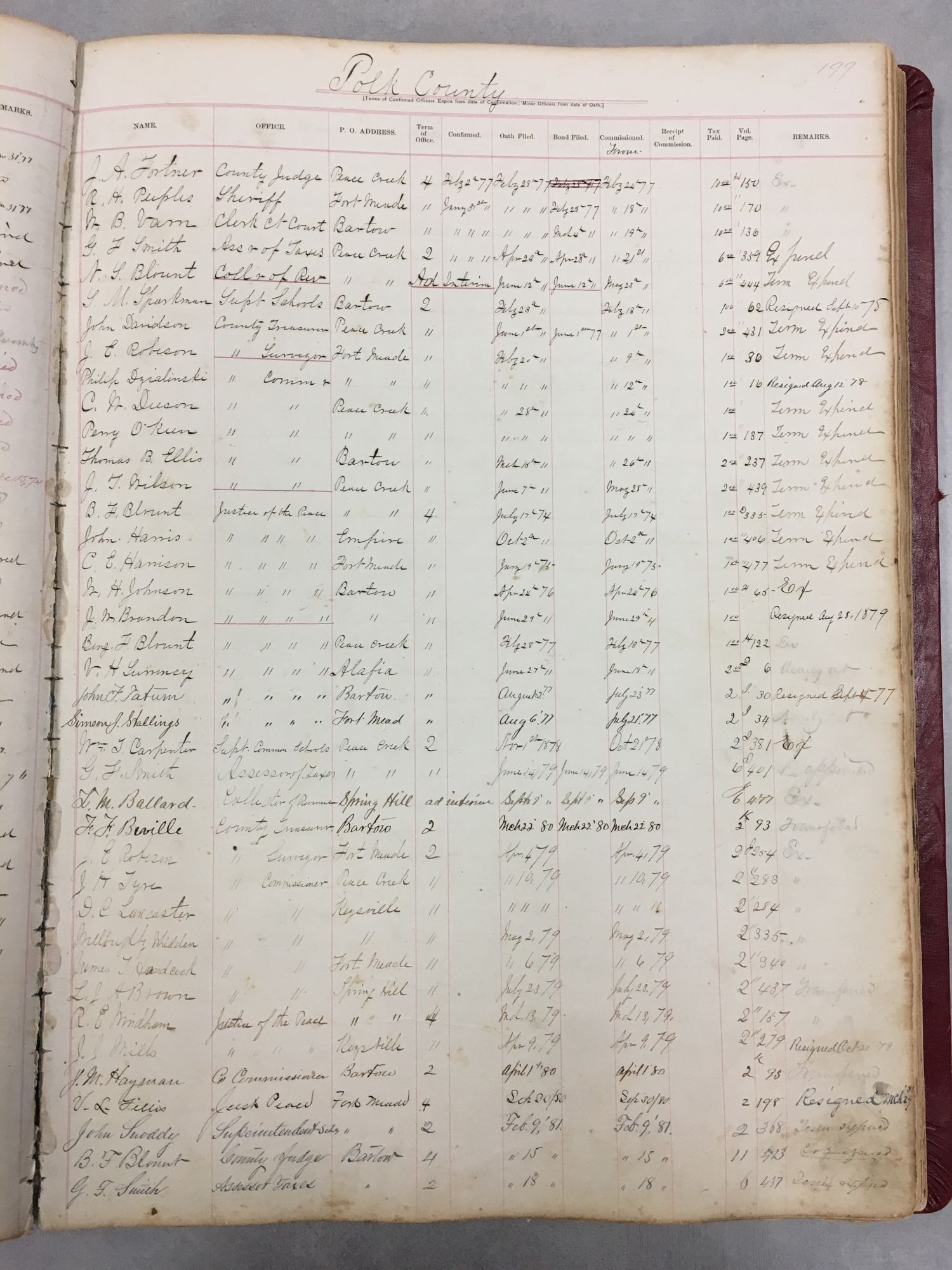
This is an example of a page from one of the Secretary of State’s directories of county and state officers (Series S1284). This one happens to be for officers commissioned for Polk County in the late 1870s and early 1880s. These directories run from 1845 to 1997, and a separate series (Series S259) covers the territorial era.
Resignation letters are one of the best kinds of records for conducting this type of research. Many of them are very short, polite and formulaic, saying something like “I hereby tender my resignation as Justice of the Peace for ….. County, but thank you for the honor of serving, etc. etc.” Other resigning officers are a little more descriptive, revealing either something about their lives or about conditions in their community that led them to give up their office. Whether you’re researching the history of an individual or the community they served in, this can be very helpful information!
In some cases, especially in the 19th century, people resigned from county offices because they just didn’t realize what they were getting themselves into. Many smaller offices like justice of the peace or constable were appointed in those days instead of elected, and often there wasn’t much competition for them. A group of neighbors would convince someone they trusted to serve, and then send in a petition for that person to get the commission. There’s a certain rustic democratic quality to this method, but it did sometimes result in officers who weren’t totally prepared for what was coming. Take for example the case of C.P. Murdock, a Methodist minister who resigned from his post as justice of the peace in Jefferson County in 1881. He told Governor George F. Drew he wouldn’t mind serving as a notary public, but the justice system just wasn’t for him. “I find that the ill will and strife which not infrequently attends little petty lawsuits,” he wrote, “are not compatible with my feelings as a Minister of the Gospel.”
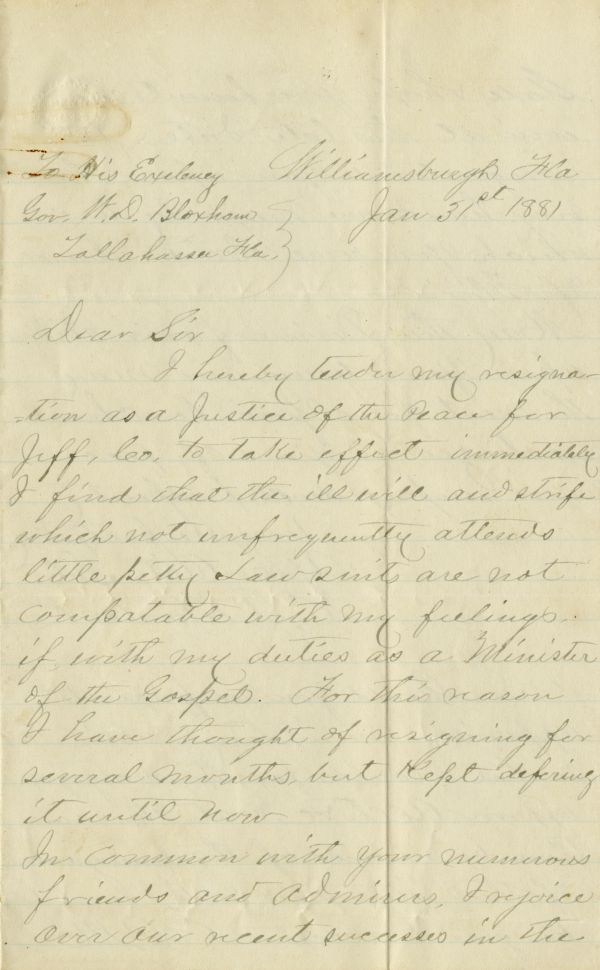
Letter from Charles P. Murdock to Governor William D. Bloxham, resigning his position as justice of the peace in the area near Williamsburg (now called Aucilla) in Jefferson County (1881). Box 1, folder 8, Letters of resignation and removals from office (Series S1326), State Archives of Florida.
D.W. Lister had a similar issue over in Lafayette County in 1880. In his resignation letter, he explained to Governor Drew that he took the office “not knowing what kind of county I was in as I had just arrived to it.” He wrote that he found it impossible to both exercise his duties as a justice of the peace and live in harmony with his neighbors, the same people he would be called by duty to prosecute for crimes like petit larceny, public drunkenness, etc. “While I am ready to admit it is impossible to please all,” he wrote, “I fail in a grate [sic] measure to please any.”
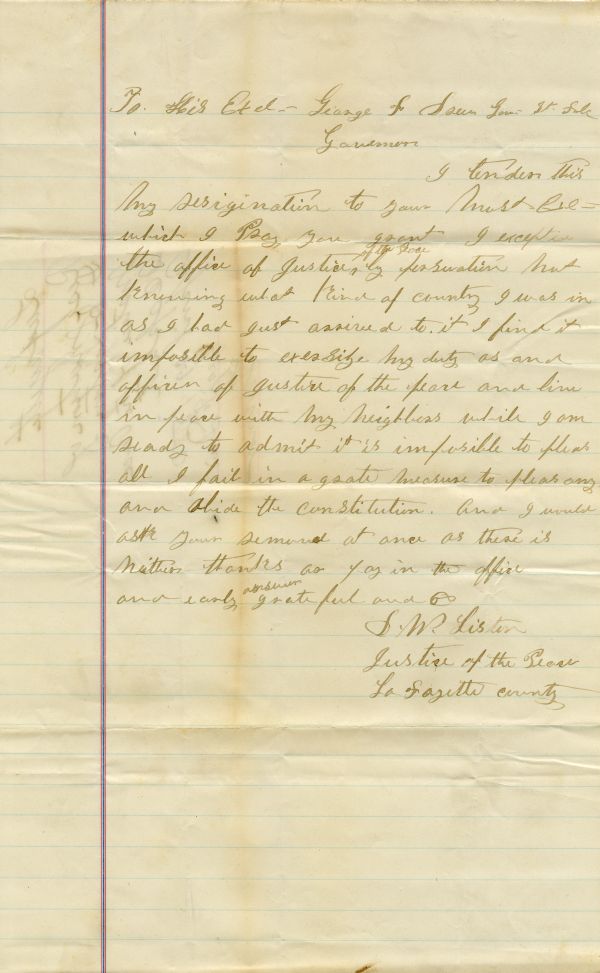
Letter from D.W. Lister to Governor George Franklin Drew, resigning his position as justice of the peace for Lafayette County (1880). Box 1, folder 9, Letters of resignation and removals from office (Series S1326), State Archives of Florida.
Some officials simply didn’t realize what kind of work was involved with the job. Adam Young, a farmer from Suwannee County, resigned his post as collector of revenue in 1876 after a new formula for calculating the sharing of tax money between the county and state threw him for a loop. “I find myself incompetent to attend to the duties required of me by the new system,” he wrote to Governor Marcellus Stearns. “Making reports and keeping the books requires a better mathematician than I am.”
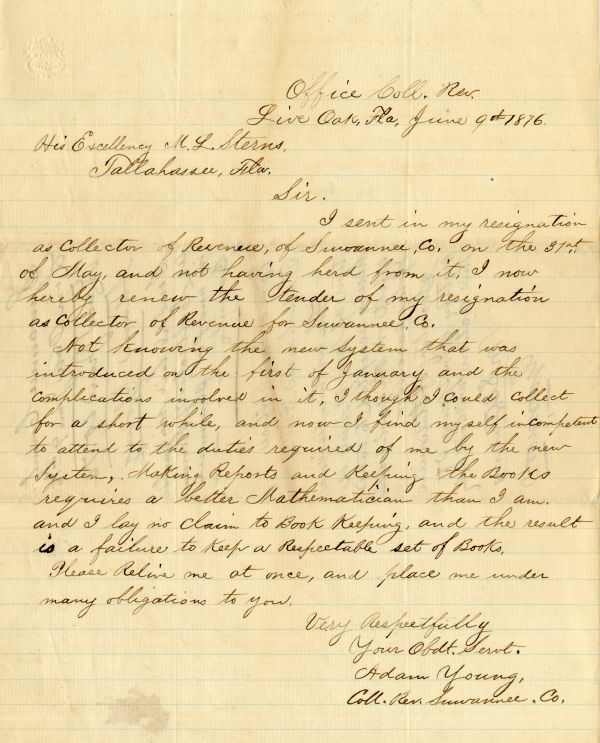
Letter from Adam Young to Governor Marcellus Lovejoy Stearns, resigning his position as collector of revenue for Suwannee County (1876). Letters of resignation and removals from office (Series S1326), State Archives of Florida.
Many county officers resigned their offices because they moved away from the area and could no longer serve the county or the part of the county they were assigned to. This was an especially common issue before the arrival of the automobile. In at least a few cases, however, it wasn’t the officer who moved, but the county itself! That’s what happened to Alden N. Sibley, a notary public for Sumter County. In 1887, he wrote to Governor Edward A. Perry resigning his commission and asking for a new one because, as he put it, his part of the county around Astatula had been “cut off” to form Lake County. Governor Perry obliged and ordered that Sibley receive the proper commission.
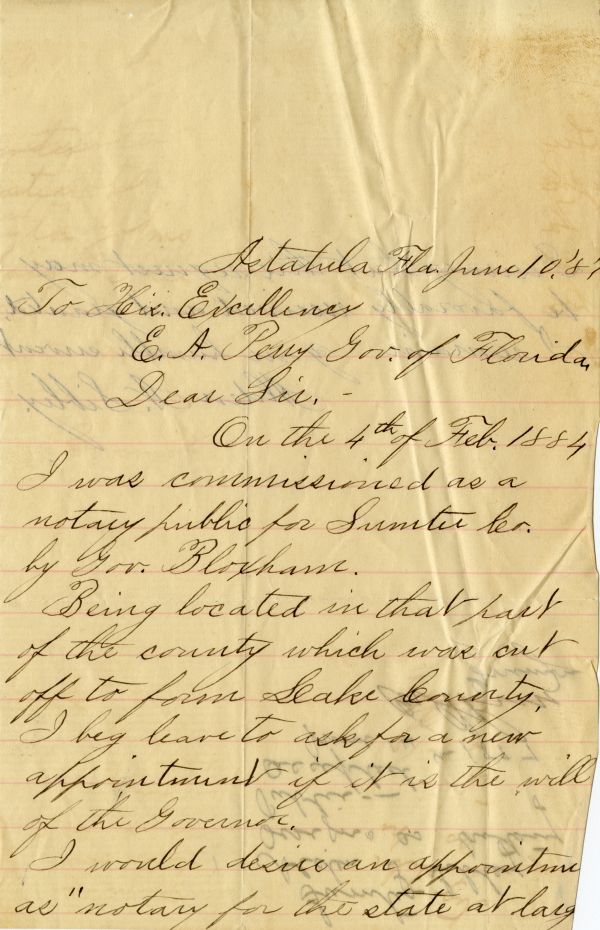
Letter from Alden N. Sibley of Astatula to Governor Edward Ayleworth Perry, resigning as a notary public (1887). Letters of resignation and removals from office (Series S1326), State Archives of Florida.
Sometimes resignations occurred as a matter of routine, either because a new governor had taken office or a new law had passed changing the nature of the position, or sometimes because the office had been eliminated. When Samuel McInnis of Hamilton County received a letter from Secretary of State Samuel McLin asking for his resignation as justice of the peace, McInnis wasn’t too bothered. In fact, he responded with a polite resignation letter and even a poem:
“Your Honor” no more to be called
But plain, simple Mister to be.
No more to the Court House be hauled
Nor grieve for the loss of a fee.
The “fee” refers to the fact that justices of the peace received a portion of the court costs associated with their efforts to try minor cases.
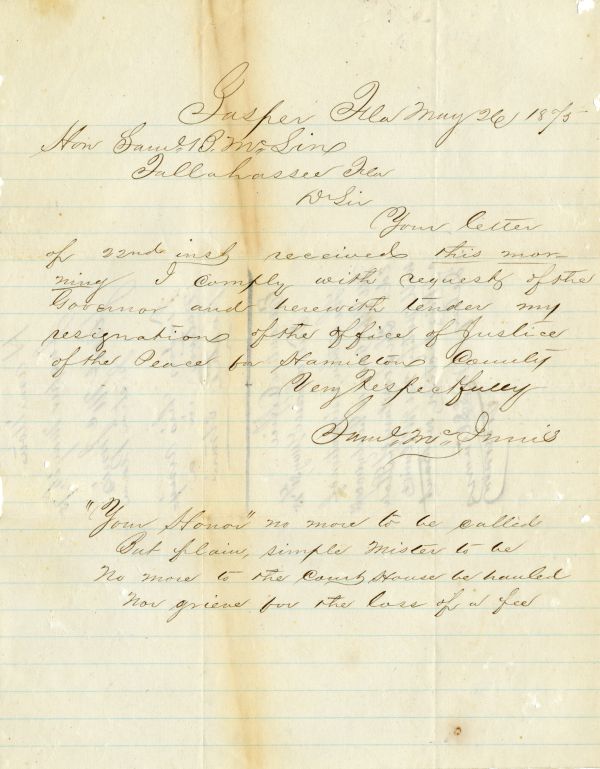
Letter from Samuel McInnis to Secretary of State Samuel B. McLin, resigning his office as justice of the peace for Hamilton County (1875). Letters of resignation and removals from office (Series S1326), State Archives of Florida.
What kinds of historical gems could you find in records documenting the service of public officials from your county? That’s the exciting part of archival research – you never know what’s likely to turn up until you look. Check out the following records series for more information on some of the documents we have illustrating the service of county officials, and plan a visit to the State Archives in Tallahassee!
Series S1284: State and County Directories, 1845-1997
Series S259: Lists of Territorial, State, and County Officers, 1827-1923
Series S622: Oaths and Bonds of Public Officials, 1845-2004
Series S1326: Resignations and Removals from Public Office, 1844-1904
Cite This Article
Chicago Manual of Style
(17th Edition)Florida Memory. "I Quit!!!." Floridiana, 2018. https://www.floridamemory.com/items/show/332832.
MLA
(9th Edition)Florida Memory. "I Quit!!!." Floridiana, 2018, https://www.floridamemory.com/items/show/332832. Accessed February 26, 2025.
APA
(7th Edition)Florida Memory. (2018, May 5). I Quit!!!. Floridiana. Retrieved from https://www.floridamemory.com/items/show/332832

 Listen: The Bluegrass & Old-Time Program
Listen: The Bluegrass & Old-Time Program